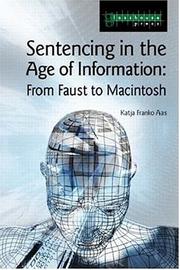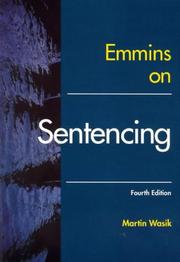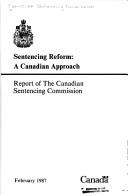| Listing 1 - 10 of 609 | << page >> |
Sort by
|

ISBN: 1904385389 1904385397 9781904385387 Year: 2005 Publisher: London: Glasshouse press,
Abstract | Keywords | Export | Availability | Bookmark
 Loading...
Loading...Choose an application
- Reference Manager
- EndNote
- RefWorks (Direct export to RefWorks)
How does the fact that we live in information societies reflect on the nature of penal discourse and practice? Applying media and communication studies to sentencing and penal culture, Franko Aas offers a lucid and innovative account of how punishment is adjusting to a new cultural climate marked by growing demands for information processing, transparency and accountability. The book explores a number of recent penal developments, such as risk assessment instruments, sentencing guidelines and computerised sentencing information systems, and argues that they are instruments of justice with so-called Macintosh traits, offering pre-programmed answers and solutions. The book addresses a number of compelling questions such as: Is sentencing - or any other penal profession - art or science, and can it be made programmable? Why do offenders increasingly receive standardised rather than individualised responses from the penal system? The book touches upon issues of decision-making at-a-distance, exercise of discretion, databases, disembodiment and the changing nature of subjectivity. The author explores information technology as a cultural environment with profound implications for the nature of penal knowledge, governance and identity constitution.
Book
ISBN: 019968457X 9780199684571 Year: 2013 Publisher: Oxford Oxford University Press
Abstract | Keywords | Export | Availability | Bookmark
 Loading...
Loading...Choose an application
- Reference Manager
- EndNote
- RefWorks (Direct export to RefWorks)

ISBN: 1841742457 Year: 2001 Publisher: London Blackstone
Abstract | Keywords | Export | Availability | Bookmark
 Loading...
Loading...Choose an application
- Reference Manager
- EndNote
- RefWorks (Direct export to RefWorks)
Book
ISBN: 0191682330 0585162263 9780191682339 Year: 1995 Publisher: Oxford : Clarendon,
Abstract | Keywords | Export | Availability | Bookmark
 Loading...
Loading...Choose an application
- Reference Manager
- EndNote
- RefWorks (Direct export to RefWorks)
The 1991 Criminal Justice Act, requires that sentences be 'proportionate' to the severity of the crime. This book discusses how sentences may be scaled proportionately to the gravity of the crime. Topics dealt with include how the idea of a penal censure justifies proportionate sentences and how political pressures impinge on sentencing policies.
Book
ISBN: 9780226440774 Year: 2016 Publisher: Chicago London University of Chicago Press
Abstract | Keywords | Export | Availability | Bookmark
 Loading...
Loading...Choose an application
- Reference Manager
- EndNote
- RefWorks (Direct export to RefWorks)
Book
ISBN: 9780511678592 Year: 2010 Publisher: Cambridge : Cambridge University Press,
Abstract | Keywords | Export | Availability | Bookmark
 Loading...
Loading...Choose an application
- Reference Manager
- EndNote
- RefWorks (Direct export to RefWorks)
Andrew Ashworth expertly examines the key issues in English sentencing policy and practice including the mechanisms for producing sentencing guidelines. He considers the most high-profile stages in the criminal justice process such as the Court of Appeal's approach to the custody threshold, the framework for the sentencing of young offenders and the abiding problems of previous convictions in sentencing. Taking into account the Criminal Justice and Immigration Act 2008 and the Coroners and Justice Act 2009, the book's inter-disciplinary approach places the legislation and guidelines on sentencing in the context of criminological research, statistical trends and theories of punishment. By examining the law in relation to elements of the wider criminal justice system, including the prison and probation services, students gain a rounded perspective on the relevant principles and problems of sentencing and criminal justice.
Book
ISBN: 3748941021 3756005909 Year: 2023 Publisher: Baden-Baden : Nomos Verlagsgesellschaft mbH & Co. KG,
Abstract | Keywords | Export | Availability | Bookmark
 Loading...
Loading...Choose an application
- Reference Manager
- EndNote
- RefWorks (Direct export to RefWorks)
Das Werk widmet sich dem (Privat-)Wohnungseinbruchdiebstahl nach § 244 Abs. 1 Nr. 3, Abs. 4 StGB. Ein besonderer Schwerpunkt liegt auf der Rechtswirklichkeit der Strafzumessung bei dem Delikt. Auf Grundlage einer multiperspektivischen Betrachtung der Erscheinungsformen des Phänomens und seiner rechtlichen Bewertung untersucht die Arbeit die Reform des Tatbestandes und die Praxis der tatgerichtlichen Strafzumessung bei dem Delikt. Insbesondere werden Unterschiede im Strafmaß, die nicht hinreichend durch Sachverhaltsunterschiede der zugrundeliegenden Fälle erklärt werden können, sowie Defizite in der Begründung der Strafzumessungsentscheidungen aufgezeigt. Die Arbeit legt einen Handlungsbedarf im Strafzumessungsrecht offen. This study addresses the phenomenon of domestic burglary (§ 244 (1) No. 3, (4) German Criminal Code). Particular emphasis is placed on the realities of criminal sentencing for this offense. Based on a multi-perspective analysis of the various appearances of the phenomenon and its legal classification, the study examines the reform of § 244 GCC and the realities of sentencing in criminal courts for the offense. In particular, discrepancies in sentencing that cannot be adequately explained by differences in factual circumstances of the underlying cases, and deficits in the written reasons for sentencing decisions are highlighted. The study reveals a need for action in the field of criminal sentencing.
Book
Year: 1970 Publisher: London: Heinemann,
Abstract | Keywords | Export | Availability | Bookmark
 Loading...
Loading...Choose an application
- Reference Manager
- EndNote
- RefWorks (Direct export to RefWorks)

ISBN: 9780660122458 0660122456 Year: 1987 Publisher: Ottawa: Canadian government publishing centre,
Abstract | Keywords | Export | Availability | Bookmark
 Loading...
Loading...Choose an application
- Reference Manager
- EndNote
- RefWorks (Direct export to RefWorks)
Book
ISBN: 9781555531409 1555531407 Year: 1992 Publisher: Boston: Northeastern University press,
Abstract | Keywords | Export | Availability | Bookmark
 Loading...
Loading...Choose an application
- Reference Manager
- EndNote
- RefWorks (Direct export to RefWorks)
| Listing 1 - 10 of 609 | << page >> |
Sort by
|

 Search
Search Feedback
Feedback About UniCat
About UniCat  Help
Help News
News